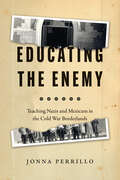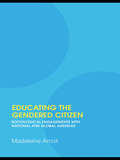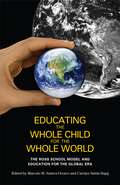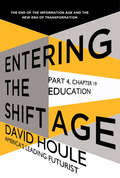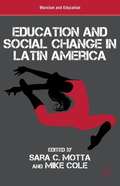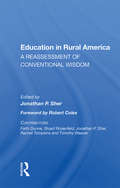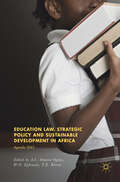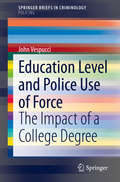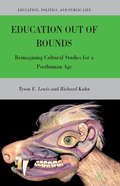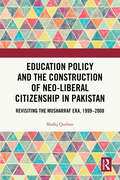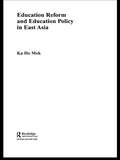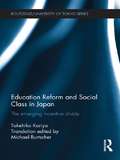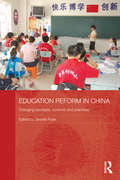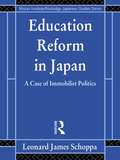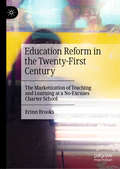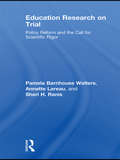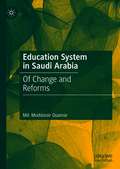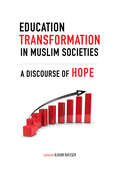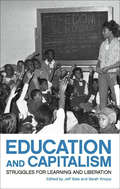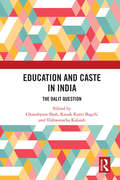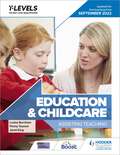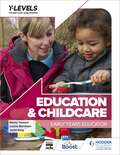- Table View
- List View
Educating the Enemy: Teaching Nazis and Mexicans in the Cold War Borderlands
by Jonna PerrilloCompares the privileged educational experience offered to the children of relocated Nazi scientists in Texas with the educational disadvantages faced by Mexican American students living in the same city. Educating the Enemy begins with the 144 children of Nazi scientists who moved to El Paso, Texas, in 1946 as part of the military program called Operation Paperclip. These German children were bused daily from a military outpost to four El Paso public schools. Though born into a fascist enemy nation, the German children were quickly integrated into the schools and, by proxy, American society. Their rapid assimilation offered evidence that American public schools played a vital role in ensuring the victory of democracy over fascism. Jonna Perrillo not only tells this fascinating story of Cold War educational policy, but she draws an important contrast with another, much more numerous population of children in the El Paso public schools: Mexican Americans. Like everywhere else in the Southwest, Mexican American children in El Paso were segregated into “Mexican” schools, where the children received a vastly different educational experience. Not only were they penalized for speaking Spanish—the only language all but a few spoke due to segregation—they were tracked for low-wage and low-prestige careers, with limited opportunities for economic success. Educating the Enemy charts what two groups of children—one that might have been considered the enemy, the other that was treated as such—reveal about the ways political assimilation has been treated by schools as an easier, more viable project than racial or ethnic assimilation.
Educating the Enemy: Teaching Nazis and Mexicans in the Cold War Borderlands
by Jonna PerrilloCompares the privileged educational experience offered to the children of relocated Nazi scientists in Texas with the educational disadvantages faced by Mexican American students living in the same city. Educating the Enemy begins with the 144 children of Nazi scientists who moved to El Paso, Texas, in 1946 as part of the military program called Operation Paperclip. These German children were bused daily from a military outpost to four El Paso public schools. Though born into a fascist enemy nation, the German children were quickly integrated into the schools and, by proxy, American society. Their rapid assimilation offered evidence that American public schools played a vital role in ensuring the victory of democracy over fascism. Jonna Perrillo not only tells this fascinating story of Cold War educational policy, but she draws an important contrast with another, much more numerous population of children in the El Paso public schools: Mexican Americans. Like everywhere else in the Southwest, Mexican American children in El Paso were segregated into “Mexican” schools, where the children received a vastly different educational experience. Not only were they penalized for speaking Spanish—the only language all but a few spoke due to segregation—they were tracked for low-wage and low-prestige careers, with limited opportunities for economic success. Educating the Enemy charts what two groups of children—one that might have been considered the enemy, the other that was treated as such—reveal about the ways political assimilation has been treated by schools as an easier, more viable project than racial or ethnic assimilation.
Educating the Gendered Citizen: sociological engagements with national and global agendas
by Madeleine ArnotGlobalisation and global human rights are the two major forces in the twenty-first century which are likely to shape the sort of learner citizen created by the educational system. Schools will be expected to prepare young men and women for national as well as global citizenship. Male and female citizens will need to adapt to new social conditions, only some of which will encourage gender equality. This book offers a unique introduction to the contribution that sociological research on the education of the citizen can make to these national and global debates. It brings together for the first time a selection of influential new and previously published papers by Madeleine Arnot on the theme of gender, education and citizenship. It describes feminist challenges to liberal democracy, the gendered construction of the ‘good citizen’ and citizenship education; it explores the implications of social change for the learner citizen and offers alternative gender-sensitive models of global citizenship education. Reaching right to the heart of current debates, the chapters focus on: feminist democratic values in education teachers’ constructions of the gendered citizen European languages of citizenship the inclusion of women’s rights into English citizenship textbooks gender struggles for equality in school pedagogy and curriculum the implications of personalised learning for the individualised learner citizen globalisation and the construction of a global ethic for citizenship education . It will be an invaluable text for all those interested in citizenship education, gender studies, sociology of education, educational policy studies, critical pedagogy and curriculum studies and international or comparative education.
Educating the Whole Child for the Whole World: The Ross School Model and Education for the Global Era
by Carolyn Sattin-Bajaj Marcelo M. Suérez-OrozcoAn examination of new approaches to educating children in a globalized worldAt the dawn of the twenty-first century, we are living in a global era, yet schooling systems remain generally reactive and slow to adapt to shifting economic, technological, demographic, and cultural terrains. There is a growing urgency to create, evaluate, and expand new models of education that are better synchronized with the realities of today’s globally linked economies and societies.Educating the Whole Child for the Whole World examines one such model: the ethos and practices of the Ross Schools and their incubation, promotion, and launching of new ideas and practices into public education. Over the last two decades Ross has come to articulate a systematic approach to education consciously tailored for a new era of global interdependence.In this volume, world-renowned scholars from a variety of disciplines, as well as veteran teachers, administrators, and students, come together to examine some of the best practices in K-12 education in the context of an increasingly interconnected world. Together they explore how the Ross model of education, which cultivates in students a global perspective, aligns with broader trends in the arts, humanities, and sciences in the new millennium.Contributors: Nick Appelbaum, Ralph Abraham, Antonio M. Battro, Sally Booth, Michele Clays, Elizabeth M. Daley, Antonio Damasio, Hanna Damasio, Kurt W. Fischer, Howard Gardner, Vartan Gregorian, Christina Hinton, Hideaki Koizumi, Debra McCall, Carolyn Sattin-Bajaj, John Sexton, Carola Suárez-Orozco, Marcelo M. Suárez-Orozco, William Irwin Thompson, and Sherry Turkle
Education (Entering the Shift Age, eBook #7)
by David HouleThis book by noted futurist, David Houle, is a call to action for people who are part of a growing movement concerned about education in America and who are committing time and effort toward its transformation. This book is not the answer, but a call to action, an offering of a vision and a necessary expansion of the creative discussion to formulate the solution so essential to the ongoing vitality of our country. The book will look at the roots of American education, the current landscape, and the forces and dynamics that are pushing inevitable change in education for our children. Transformation of education is inevitable and asking the right questions, expanding our vision and starting to do something now are key elements the author outlines. Politicians, principals, school superintendents, and education foundation executives as well as parents should be reading this book as an enabler for their points of view about the need to change K-12 education in the years ahead.
Education And Social Change In Latin America
by Mike Cole Sara C. MottaThis book examines the multiple relationships between education, pedagogy, and social change in Latin America and beyond through a discussion of critical theory in education and its uses in Latin American society today. An international group of contributors discuss both individual countries and the region as a whole.
Education In Rural America: A Reassessment Of Conventional Wisdom
by Jonathan P. SherIndifference has not always characterized American attitudes toward rural children, nor has neglect always been the cornerstone of state and federal policy toward rural education. Indeed, for nearly a century there was an avid and influential—though ultimately ineffective—rural school reform movement in the United States. But in recent years, rural education has become a "skeleton in the closet" of the education profession. More than 14 million children attend rural schools that receive only minuscule amounts of the nation s financial resources and professional attention. The authors of this book carefully analyze the beliefs, assumptions, policies, and practices that have shaped and continue to shape education in rural America, concluding that conventional wisdom in rural education has proved to be considerably more conventional than wise. They offer pragmatic suggestions for changes in rural schools, in educational policy, and in programs designed for rural communities. As Robert Coles tells us in his Foreword to the book, they "give us clear, strong, uncluttered prose—a good sign that they are able to offer sensible, honest, unpretentious suggestions and useful ideas. They give us. . .a social history that enables perspective . . . and [they give us] practical, well-argued suggestions for a public policy both humane and capable of realization for our rural areas."
Education Law, Strategic Policy and Sustainable Development in Africa: Agenda 2063
by A. C. Onuora-Oguno W. O. Egbewole T. E. KlevenThis book outlines the findings and suggestions of the Law and Society Association’s International Research Collaborations, which focused on the African Union’s Agenda 2063. This outlined the ideal Africa aspired to by the year 2063: ‘the Africa we want’. The authors examine socio-economic rights issues and their impact on developing a strong educational agenda that can drive Africa to realize Agenda 2063. As Africa’s development has remained slow in the face of many challenges, the need to embrace good governance, rule of law and human rights obligations are major tools to realize the continent’s potential. The project focuses in particular on the central place of education law and policy in achieving the goals of Agenda 2063.
Education Level and Police Use of Force: The Impact of a College Degree (SpringerBriefs in Criminology)
by John VespucciThis brief presents a study addressing the impact of a college degree upon officer use of force. The average American municipal police academy only requires 26 weeks of training, despite previous studies showing overwhelming support that college educated police officers apply more discretion in their use of force than officers without a college degree. Taking into account contemporary public/police conflicts and how American perceptions of police are based largely on officer use of force, this study offers a more current perspective on the profession’s changing dynamic over the past decade. With data gathered from over 400 officers from 143 distinct municipal police agencies in 6 American states, the study examines the association between a college education and the level of force used to gain compliance during arrest situations, and notes discrepancies between previously studied factors and contextual variables. This brief will be useful for researchers of policing and for those involved with police training.
Education Out of Bounds
by Tyson E. Lewis Richard KahnThrough a unique combination of critical, posthumanist, and educational theories, the authors engage in a surreal journey into the worlds of feral children, alien reptoids, and faery faiths in order to understand how social movements are renegotiating the boundaries of community.
Education Policy and the Construction of Neo-Liberal Citizenship in Pakistan: Revisiting the Musharraf Era, 1999-2008
by Shafiq QurbanThis book looks at Musharraf’s Education Reforms in Pakistan and analyses the relationship between education policy, curriculum, Pakistani identity and citizenship. It explores changes in the curriculum and how a reformed curriculum has shaped Pakistani identity according to the exigencies of time. The book underscores the significant role that Musharraf’s reforms to revamp the curricula at formal educational institutions, from primary to higher education levels, as well as in the Madrassas, to make the curricula compatible with global education trends. The government aimed to replace all outdated content that promoted hatred, extremism and the status quo, with new themes informed by tolerance, interfaith harmony, human rights, environmental preservation, loyalty, the moderate vision of Islam, and skills orientation. The purpose of these themes in the curricula was to make education market-oriented and to construct a Pakistani identity in the context of Neo-Liberal Citizenship. The book provides an in-depth look into the transformation of education curriculum in Pakistan focusing on the exploration of the intersections between education, politics, and citizenship in Pakistani society.This book is an essential read for anyone interested in understanding the impact of education policies on citizenship and political processes in Pakistan. Its insightful analysis and thorough research make it an excellent resource for students, scholars, and teachers working in the fields of anthropology, citizenship studies, education, Islamic studies, gender studies, Pakistan studies, political science, political sociology, public policy and South Asian studies."
Education Reform and Education Policy in East Asia (Routledge Advances in Asia-Pacific Studies #Vol. 10)
by Ka-ho MokThis book assesses the impact of globalization on the education systems of key East Asian countries, including China, Hong Kong, Japan, and the "tiger economies" of South Korea, Taiwan and Singapore, examining how the increasingly interdependent economic system has driven policy change and education reform. It discusses how policy makers have responded to changes required in educational outcomes in order to equip their societies for new global conditions and explores the impact of new approaches and ideologies related to globalization, such as marketization, privatization, governance changes, managerialism, economic rationalism and neo-liberalism, making comparisons across the region. Based upon in-depth research, fieldwork, literature analysis, policy document analysis and personal reflections of academics serving in the education sector, this volume recounts heated debates about the pros and cons of education restructuring in East Asia. The discussions on national responses and coping strategies in this volume offer highly relevant insights on how globalization has resulted in restructuring and draws lessons from comparative public policy analysis and comparative education studies.
Education Reform and Social Class in Japan: The emerging incentive divide (Routledge/University of Tokyo Series)
by Takehiko KariyaUntil the early 1990s, Japanese education was widely commended for achieving outstanding outcomes in global comparison. At the same time, it was frequently criticized for failing to cultivate 'individuality' and 'creativity' in students. Wide-ranging education reforms were enacted during the 1990s to remedy these perceived failings. However, as this book argues, the reforms produced a different outcome than intended, contributing to growing disparity in learning motivation and educational aspiration of students from different class backgrounds instead. Takehiko Kariya demonstrates by way of empirical sociological analysis that educational inequality in Japan has been expanding, and that a new mechanism of educational selection has begun to operate, which he calls the 'incentive divide'. Casting light on recent changes in Japanese society to critically reassess educational policy choices, this book's quantitative and qualitative analyses of the 'mass education society' in post-war Japan offer important insights also for understanding similar problems faced in other parts of the world at present. Translated into English for the first time, the Japanese language version of Education Reform and Social Class in Japan won the first Osaragi Jirō Prize for Commentary sponsored by the Asahi shinbun. This book will be of interest to students and scholars in the fields of Asian studies, Japanese studies, education, sociology and social policy.
Education Reform in China: Changing concepts, contexts and practices (Routledge Contemporary China Series)
by Janette RyanOver the past decade there has been radical reform at all levels of China’s education system as it attempts to meet changing economic and social needs and aspirations. Changes have been made to pedagogy and teacher professional learning and also to the curriculum - both at the basic education level, from kindergarten to year 12, and at the higher education level. This book focuses on reform at the early childhood, primary and secondary levels, and is the companion book to China’s Higher Education Reform and Internationalisation, which covers reform at the higher education level. Education Reform in China outlines the systematic transformation that has occurred of school curriculum goals, structure and content, teaching and learning approaches, and assessment and administrative structures, including the increasing devolvement of control from the centre to provincial, district and school levels. As well as illustrating the changes that are occurring within classrooms, it demonstrates the continuity of cultural and educational ideas and values in the midst of these changes, showing that reform does not just involve the adoption of foreign ideas, but builds on and even resurrects traditional Chinese educational values. Importantly, it considers how exchanges of people and ideas can contribute to new ways of working between Western and Chinese educational systems.
Education Reform in Japan: A Case of Immobilist Politics (Nissan Institute/Routledge Japanese Studies)
by Leonard James SchoppaThe Japanese education system, while widely praised in western countries, is subject to heavy criticism within Japan. Education Reform in Japan analyses this criticism, and explains why proposed reforms have failed. The author shows how the Japanese policy-making process can become paralysed when there is disagreement, and argues that this `immobilism' can affect other areas of Japanese policy-making.
Education Reform in the Twenty-First Century: The Marketization of Teaching and Learning at a No-Excuses Charter School
by Erinn BrooksThis book explores how, why, and with what consequences one no-excuses charter network marketizes teaching and learning, through the author’s 1000 hours of covert participant observation at a network charter school. In her research, Brooks found that the “AAG” (pseudonym) network re-conceptualized teaching by urging staff to envision their careers in corporate education rather than in classroom teaching. While some employees received a boost up the corporate ladder, others found themselves being pushed out of the organization. Despite AAG’s equity-conscious discourse, administrators emphasized controlling student behavior as a central measure of teaching effectiveness. Brooks develops the concept of creative compliance to describe the most successful teachers’ tactics for adhering to formal policies strategically, bending the rules in order to survive and advance in a workplace fraught with competition and insecurity.
Education Research On Trial: Policy Reform and the Call for Scientific Rigor
by Annette Lareau Pamela Barnhouse Walters Sheri H. RanisRead the author's commentary for the Teachers College Record here: http://www.tcrecord.org/Content.asp?ContentID=15915 It is not an exaggeration to say that the field of education has been under attack. Many, particularly in Washington, D.C., have proclaimed the research to be shoddy. They have called for new "scientific" standards for research. Randomized control trials have been promoted. In many of these discussions, the only criterion is making a more rational and scientific approach to education research. Since the federal government plays a leadership role in defining the terms of education debates, this critique is important. It stands to radically reshape research and possibly school priorities in the future. The essays in this book take up this important topic. They offer critical insight into how this debate came to flourish. Some of the authors take issue with core assertions of the debate; other are sympathetic. Taken together, they help to broaden and deepen our understanding of the efforts to revamp the field of education research and, ultimately education. The chapters also discuss the factors that facilitate, and impede, research from having an impact on policy. Teaching and Learning Goals Include: -- helps illuminate the relationship between education research and policy --critically examines key assumptions of federal legislation particularly the call for scientific rigor in the No Child Left Behind Legislation --helps students understand the broader intellectual context of this crisis in education
Education System in Saudi Arabia: Of Change and Reforms
by Md. Muddassir QuamarThis book is a comprehensive study on the education system of Saudi Arabia, placing the reforms and changes it has undergone in the past two decades within the context of the historical evolution of the education system. An education system cannot be seen in isolation of the society; it plays a significant role in shaping the individual, state and the society, that in turn, have a bearing on the education system and its evolution. Therefore, this book locates Saudi education in the backdrop of the changes in the society, how they have facilitated or hindered the education reforms and how the education reforms have impacted the society. The book does not ignore the immediate trigger for the beginning of a comprehensive reforms process but goes beyond it to find much deeper socio-political and economic rationales that paved the way for the reforms. It provides a nuanced understanding of the interplays of various socioeconomic as well as political factors that have shaped the education system in Saudi Arabia.
Education Transformation in Muslim Societies: A Discourse of Hope (Advancing Education in Muslim Societies)
by Shelley Wong Nuraan Davids Andreas M. Krafft Bassam Abu Hamad Mualla Selcuk Suhailah Hossien Sulieman Mleahat Nora El-Bilawi Sher Afgan Tareen Afeefa Syeed Tyron PittsHope is a complex concept—one academics use to accept the unknown while also expressing optimism. However, it can also be an action-oriented framework with measurable outcomes.In Education Transformation in Muslim Societies, scholars from around the world offer a wealth of perspectives for incorporating hope in the education of students from kindergarten through university to stimulate change, dialogue, and transformation in their communities. For instance, though progress has been made in Muslim societies on early education and girls' enrollment, it is not well documented. By examining effective educational initiatives and analyzing how they work, educators, policymakers, and government officials can create a catalyst for positive educational reform and transformation. Adopting strength-based educational discourse, contributors to Education Transformation in Muslim Societies reveal how critical the whole-person approach is for enriching the brain and the spirit and instilling hope back into the teaching and learning spaces of many Muslim societies and communities.Education Transformation in Muslim Societies is a copub with the International Institute of Islamic Thought.
Education and Capitalism: Struggles for Learning and Liberation
by Jeff Bale Sarah KnoppEducators examine the state of public schooling, confront the anti-union stance of policymakers, and offer a bold new direction in this essay anthology.A conservative, bipartisan consensus dominates the discussion about what’s wrong with our schools and how to fix them. It offers “solutions” that scapegoat teachers, vilify unions, and impose a market mentality on education. In Education and Capitalism, teacher-activists expose the damaging limitations of this elite consensus and offer an alternative vision of learning for liberation.Co-editors Sarah Knopp and Jeff Bale presents a powerful defense of public education. Other contributors offer historical analysis of school reform with a focus on civil rights and union-led movements. Arguing that today’s schools are designed to serve the needs of capitalism rather than students, this volume offers an action plan for positive change.
Education and Caste in India: The Dalit Question
by Ghanshyam Shah Kanak Kanti Bagchi Vishwanatha KalaiahSeven decades since Indian Independence, education takes the centre stage in every major discussion on development, especially when we talk about social exclusion, Dalits and reservations today. This book examines social inclusion in the education sector in India for Scheduled Castes (SCs). The volume: · Foregrounds the historical struggles of the SCs to understand why the quest for education is so central to shaping SC consciousness and aspirations; · Works with exhaustive state-level studies with a view to assessing commonalities and differences in the educational status of SCs today; · Takes stock of the policymaking and extent of implementations across Indian states to understand the challenges faced in different scenarios; · Seeks to analyse the differential in existing economic conditions, and other structural constraints, in relation to access to quality educational facilities; · Examines the social perceptions and experiences of SC students as they live now. A major study, the volume will be of great interest to scholars and researchers of education, sociology and social anthropology, development studies and South Asian studies.
Education and Childcare T Level: Assisting Teaching: Updated for first teaching from September 2022
by Penny Tassoni Louise Burnham Janet KingBegin your path to a career in Education and Childcare with this T Level textbook that covers both the core content and the assisting teaching specialism content you will need to understand to be successful in your qualification. For first teaching from September 2022.Develop your understanding of the key principles, concepts, theories and skills that will give you a solid foundation of knowledge to support you during your industry placement.Created in partnership with CACHE and written by highly respected authors Penny Tassoni, Louise Burnham and Janet King, you can feel confident relying on the insights and experience of these experts.- Track and consolidate your learning using the learning outcomes at the beginning of every unit and Test Yourself questions throughout each unit- Ensure you don't miss any important terminology with key terms highlighted and defined in context- Contextualise your learning with case studies, reflection tasks and practice points- Prepare for your examinations with knowledge-based practice questions- Understand how to approach your assignments with practical tasks and model answers
Education and Childcare T Level: Assisting Teaching: Updated for first teaching from September 2022
by Penny Tassoni Louise Burnham Janet KingBegin your path to a career in Education and Childcare with this T Level textbook that covers both the core content and the assisting teaching specialism content you will need to understand to be successful in your qualification. For first teaching from September 2022.Develop your understanding of the key principles, concepts, theories and skills that will give you a solid foundation of knowledge to support you during your industry placement.Created in partnership with CACHE and written by highly respected authors Penny Tassoni, Louise Burnham and Janet King, you can feel confident relying on the insights and experience of these experts.- Track and consolidate your learning using the learning outcomes at the beginning of every unit and Test Yourself questions throughout each unit- Ensure you don't miss any important terminology with key terms highlighted and defined in context- Contextualise your learning with case studies, reflection tasks and practice points- Prepare for your examinations with knowledge-based practice questions- Understand how to approach your assignments with practical tasks and model answers
Education and Childcare T Level: Early Years Educator
by Penny Tassoni Louise Burnham Janet KingBegin your path to a career in Education and Childcare with this T Level textbook that covers both the core content and the education and childcare specialism content you will need to understand to be successful in your qualification.Develop your understanding of the key principles, concepts, theories and skills that will give you a solid foundation of knowledge to support you during your industry placement.Created in partnership with CACHE and written by highly respected authors Penny Tassoni, Louise Burnham and Janet King, you can feel confident relying on the insights and experience of these experts.- Track and consolidate your learning using the learning outcomes at the beginning of every unit and Test Yourself questions throughout each unit- Ensure you don't miss any important terminology with key terms highlighted and defined in context- Contextualise your learning with case studies, reflection tasks and practice points- Prepare for your examinations with knowledge-based practice questions- Understand how to approach your assignments with practical tasks and model answers
Education and Childcare T Level: Early Years Educator
by Penny Tassoni Louise Burnham Janet KingBegin your path to a career in Education and Childcare with this T Level textbook that covers both the core content and the education and childcare specialism content you will need to understand to be successful in your qualification.Develop your understanding of the key principles, concepts, theories and skills that will give you a solid foundation of knowledge to support you during your industry placement.Created in partnership with CACHE and written by highly respected authors Penny Tassoni, Louise Burnham and Janet King, you can feel confident relying on the insights and experience of these experts.- Track and consolidate your learning using the learning outcomes at the beginning of every unit and Test Yourself questions throughout each unit- Ensure you don't miss any important terminology with key terms highlighted and defined in context- Contextualise your learning with case studies, reflection tasks and practice points- Prepare for your examinations with knowledge-based practice questions- Understand how to approach your assignments with practical tasks and model answers
